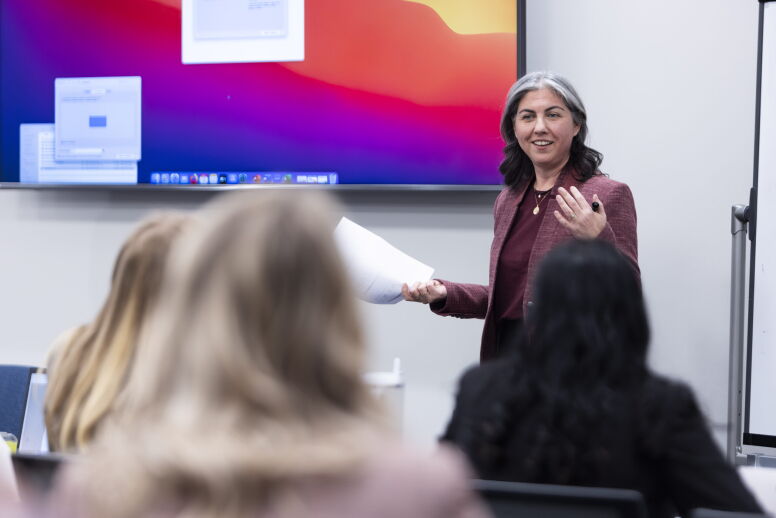News & Stories
Strategizing for innovation

Professor Isin Guler has embarked on an unconventional path for a new line of research: Texan prisons.
With America boasting one of the world’s highest incarceration rates, Guler and former doctoral student Robert Hill (PhD ’22) seek to explore entrepreneurship as a solution to complex issues plaguing the prison system.
While many prisons tend to emphasize punishment over rehabilitation, Guler envisions entrepreneurship as a way to break the cycle of recidivism and offer a fresh start to released inmates.
 “The rates of reoffending are exceptionally high: one in three inmates return to prison within three years of being released. Part of the reason is because it’s hard to get gainful employment; there is a lot of stigma,” says Guler.
“The rates of reoffending are exceptionally high: one in three inmates return to prison within three years of being released. Part of the reason is because it’s hard to get gainful employment; there is a lot of stigma,” says Guler.
Through their research into the Texas Prison Entrepreneurship Program, they discovered participants exhibited significantly lower rates of recidivism – almost one third of the rate observed for those who did not participate in the program.
Armed with these insights, Guler recommended interventions aimed at enhancing the program’s impact, including testimonials to motivate prisoners and reduce dropout rates. “I’m excited by the application of ideas in practice and making a real-world impact,” she says.
Guler’s central research interest lies in unraveling how firms manage innovation — a highly uncertain process with often huge sums of investment on the line. “As an established firm, you need reliable profitability and growth, but you need to balance that against the need to take risks and innovate,” she says.
Her exploration into the venture capital (VC) industry has provided her with insights into this conundrum. VC firms, known as drivers of innovation for their funding and support for startups, sometimes fail to terminate investments in portfolio firms, tying up capital and resources.
While this might not have been a pressing issue during periods of abundant capital the current shift in capital availability necessitates VC firms to enhance their “termination capability” to optimize resource allocation, she says. “You need to identify which investments won’t pan out, and make the tough call that you won’t go forward with them.”
Her research extends to the pharmaceutical industry, where innovation is equally vital. Guler draws parallels between VC and pharmaceutical companies, both managing portfolios and aiming to uncover the next groundbreaking discovery.
Her findings reveal how “pharma companies that were more proactive in pruning their drug development portfolios were able to cultivate higher quality inventions later on,” she says. “We tied this to the idea of learning from failures and building upon them.”
These findings have implications for entrepreneurs. Amidst the evolving VC landscape, Guler advises startups to reconsider their capital-raising strategies. Instead of only pursuing investments from top VC firms, she suggests that seeking partnerships with smaller firms could yield better results, offering a chance to stand out in a more supportive environment.
“If you’re joining a more competitive portfolio, your relative standing now matters,” she explains. “If you’re at the bottom of the pile, you won’t get good access to introductions and capital; you’ll be an also-ran.”
Guler’s commitment to research-driven impact extends to her leadership of UNC Kenan-Flagler’s PhD Program in strategy. With a deliberate focus on close student-faculty collaboration, Guler emphasizes a developmental approach. “We work with our doctoral students closely at every stage of the program, and we take an interest in their development not just as future scholars, but as individuals.”
Leveraging her extensive research — which has been published in prestigious journals such as Administrative Science Quarterly and Academy of Management – Guler imparts her insights to students through teaching and mentoring.
She offers courses on business strategy in the UNC Kenan-Flagler Executive MBA programs, and an elective on innovation strategy in the Full-Time MBA Program.
By weaving in real-world case studies, such as the rapid development of COVID-19 vaccines through mRNA technology in the pharmaceutical industry, she provides students with a dynamic and practical learning experience. “I take a close look at recent corporate developments,” she says.
Guler, a Turkish national, found her academic calling at UNC Kenan-Flagler after traversing a few academic institutions. “I always knew in my heart that I was born to be an academic,” she explains. “I’m very motivated by expanding my own thinking and challenging myself.”
 Drawn to the supportive and developmental culture at UNC Kenan-Flagler, she has found her academic home in North Carolina. “We have a collaborative culture,” she says. “And if disagreements arise, we remind each other that we are Carolina-nice.”
Drawn to the supportive and developmental culture at UNC Kenan-Flagler, she has found her academic home in North Carolina. “We have a collaborative culture,” she says. “And if disagreements arise, we remind each other that we are Carolina-nice.”
This has enabled her to flourish and contribute meaningfully to her field. “My research productivity really increased along with my own satisfaction with my work and happiness.”
Outside of academia, Guler nurtures her passion for contemporary art, adorning her home office with local artists’ creations. “I started collecting art to support artists having trouble during the pandemic, as well as to enrich my own soul through art. It has become a new learning journey.”